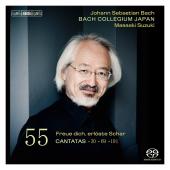J.s. Bach · Cantatas, Volume 55
Label: BIS Catalog: SACD2031 Format: SACD / CD Hybrid Bach Collegium Japan / Masaaki Suzuki; Hana Blazíková, soprano; soprano; Robin Blaze, counter-tenor; Gerd Türk, tenor; Peter Kooij, bassJ.S. Bach · Cantatas In classical music, one of the most monumental tasks that anyone could undertake is that of recording the complete church cantatas by J.S. Bach. Masaaki Suzuki and his Bach Collegium Japan recorded the first instalment of their cycle in 1995. Now, 18 years and 55 discs later, a great adventure is brought to a close. The chronological approach adopted by Suzuki means that the three works included here are the last extant cantatas by Bach's hand. But as so often with the sacred music from his late period, in all three Bach turned to earlier works. Lobe den Herrn, meine Seele, BWV69, was first performed at a Leipzig church service in 1748 celebrating the annual change of municipal leadership. With its rich orchestral scoring it was excellently suited to the task of lending appropriate artistic splendour to the political festivities, and the fact that its central movements had already been performed at a similar occasion some 25 years earlier was probably not recognized by anyone in the illustrious congregation. In Freue dich, erlöste Schar, BWV30, Bach also harks back to an earlier work, but this time of a secular nature, which explains various unusual features, such as the surprising beginning of the introductory chorus, without any instrumental prelude, and Bach's liberal use of dance models such as the passepied, the gavotte and the gigue. The closing work of the disc - and of the entire series - isn't really a cantata in the usual sense of the word: with its Latin text, it could never have been performed at a regular church service in Lutheran Leipzig in Bach's time. A reworking of the Gloria from the B minor Mass, BWV232, its three movements were possibly prepared by Bach at short notice for a special ceremony at the Leipzig University Church on Christmas Day 1745, to celebrate a peace treaty between Prussia and Saxony. Even though its connections to the genre may be regarded as tenuous, Gloria in excelsis Deo, BWV191 is traditionally included among the church cantatas - and it is difficult to think of a more suitable finale to a recording project remarkable not just for its musical qualities but also for the performers' approach to the religious dimension of these works: 'Glory to God in the highest'.  Price: $28.98 Price: $28.98 |












